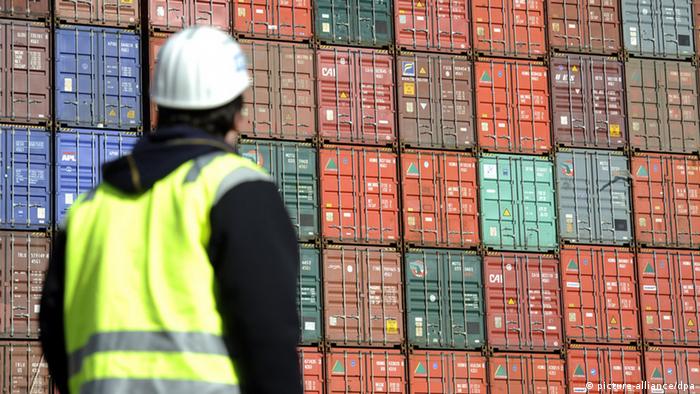Germany's critics, including the U.S. Treasury, argue that Germany's dependence on exports weighs on other countries struggling to emerge from recession. The usual German response is that others should be spurred to match its performance.
Yet some policy makers and academics are trying to raise awareness that this economic strategy comes at a heavy cost for Germans themselves. That is because the mirror image of the country's huge current-account surplus—which combines its trade surplus with other net income from abroad—is a giant deficit on its capital account. That translates into German savers hunting the world seeking high returns on their money.
German savings find their way abroad in a number of ways, including German companies making direct investments in plant and machinery in other countries. But the majority is funneled abroad through the financial system: banks, insurance companies and investment funds.
"A high export surplus means de facto that you invest a lot of saved money abroad," the European Union's economic commissioner Olli Rehn told the German newspaper Bild in an interview published Sunday. "That may make sense. What we have seen, though, is that not all German savings were invested sensibly, but instead went into toxic securities in the U.S. for instance."
Others put it less diplomatically."German savers give their money to the financial system and it gambles it away," says Sony Kapoor, a financial expert who runs the think tank Re-Define.
It sounds harsh, but some German studies show losses on German savings abroad have been spectacular, running into several hundreds of billions of euros since 2006.
The Berlin-based German Institute for Economic Research estimates that German investors have lost some €400 billion ($543 billion) through bad investments abroad since 1999, equal to around 15% of gross domestic product. Between 2006 and 2012, the losses were around €600 billion.
A study from Erik Klär, Fabian Lindner and Kenan Sehovic published in the journal Wirtschaftsdienst shows that Germany's cumulative current-account surpluses amounted to €1.28 trillion between 2000 and the third quarter of 2012.
Yet the country's total net foreign assets at the end of last year totaled just over €1 trillion. The difference—a stab at how much German savers lost in the meantime—is €269 billion. In fact, they calculate the country's savers were sitting on profits from 1999 to 2006 of €250 billion. So, their losses between 2007 and 2011 amounted to €575 billion.
Either way, it's a lot of money, lost in myriad ways—from investments in toxic U.S. securities and on government bonds from struggling euro-zone economies. Savers may not have always noticed the losses—because sometimes they have paid for them as taxpayers bailing out banks that made unwise investments—but they are losses all the same.
Recycling current-account surpluses through private financial institutions is not the only way to do it. China's have been absorbed significantly by the public sector through increases in the country's foreign-exchange reserves. But carrying huge reserves in foreign currency also entails risks—for example, a big devaluation of the dollar or a default on U.S. debt owing to political gridlock.
Germany has built its foreign-exchange reserves too. Though significantly down from their 2012 peak, they have risen eightfold to almost €800 billion.
Since the start of the euro crisis, some of Germany's surplus has also been recycled through official loans from the bloc's bailout funds to troubled governments and via euro-zone central banks to the banking systems of financially strapped euro-zone members.
None of this is ideal. Two German economists, Daniel Gros and Thomas Mayer, have argued that Germany should create a sovereign-wealth fund to recycle its surpluses. Such a fund would be better placed than banks or private investors to take a long-term investment perspective, they say. Norway's sovereign-wealth fund, created in 1998, has an annual return of 3.17% once inflation and operating costs are deducted, according to a study from Mr. Kapoor's Re-Define.
That's not spectacular—and its performance has been the subject of some internal criticism— but it's way better than Germany's financial institutions have performed over a similar period. There is no definitive evidence that Germany's financial system is worse than others at protecting savers as they shift large sums of money overseas. It's just something that's hard to do well. In the 1970s, American, Japanese, British and German banks placed the large oil surpluses from the Middle East as loans to Latin America and elsewhere. The outcome was the Latin American debt crisis of the 1980s, and losses for the banks.
It might thus serve German savers better if they kept more money at home. They have in recent decades helped finance infrastructure in Southern Europe, including "deserted" Spanish and Portuguese roads and remote regional airports, that German officials often grumble about. Directing some savings toward rebuilding their own country's sometimes-creaking infrastructure might actually prove more profitable
http://online.wsj.com/news/articles/SB10001424052702303332904579226120436774220

Δεν υπάρχουν σχόλια:
Δημοσίευση σχολίου